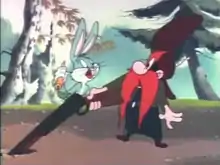Rabbit Every Monday
Rabbit Every Monday is a 1951 Warner Bros. Looney Tunes cartoon directed by Friz Freleng. The short was released on February 10, 1951, and stars Bugs Bunny and Yosemite Sam. This cartoon is also one of the few times where Sam and Bugs both win in the end.[1] The title is a play on Chicken Every Sunday.
| Rabbit Every Monday | |
|---|---|
 "What's Up? Your Time's Up Rabbit!" | |
| Directed by | I. Freleng |
| Produced by | Eddie Selzer (uncredited) |
| Story by | Warren Foster (uncredited) |
| Starring | Mel Blanc |
| Music by | Carl Stalling |
| Animation by | Manuel Perez Ken Champin Virgil Ross Art Davis |
| Layouts by | Hawley Pratt |
| Backgrounds by | Paul Julian |
| Color process | Technicolor |
| Distributed by | Warner Bros. Pictures |
Release date | February 10, 1951 |
Running time | 7:23 |
| Language | English |
It is the last short to feature Sam's mouth below his mustache; his design changes midway through the film.
Rabbit Every Monday has the distinction of being the first Looney Tunes cartoon to appear on the first episode of The Bugs Bunny Show, on October 11, 1960.
Plot
Bugs is cooking carrots on a rotisserie and singing a parody of the song "It's Magic" (from the 1948 Warner Bros. film Romance on the High Seas). Yosemite Sam is hunting and, when he smells carrots cooking, knows he must be close to a rabbit. In a "breaking the fourth wall" moment, a patron in the movie theater leaves his seat and passes in front of the screen. Sam points his rifle at him and orders him back to his seat. Sam then issues a warning to the rest of the audience. He reaches Bugs' hole and Bugs, thinking that Sam's nose is a carrot, flavours it, yanks it, and Sam, into his hole and bites his nose.
Sam jumps above ground, sticks the gun down the hole and commands Bugs to come out. Bugs emerges from Sam's gun and asks, "What's up Doc?", to which Sam replies, "Your time is up, rabbit!" and demands he remove himself from the gun. Bugs refuses so Sam releases a gun shell, which Bugs is inside of. He says to Bugs, "Now start prayin', cuz I'm a-blowin' ya to smithereenies at the count of ten!" Thinking fast, Bugs quickly chews bubble gum and sticks it into the gun. The gun backfires, surrounds Sam with a bubble and Bugs blows him down a cliff. As Sam is blowing his way back up, Bugs bursts the bubble with a pin. After a very "sticky" situation, Sam digs around the hole with Bugs in it, puts him in a sieve and proceeds to filter Bugs out. He then takes Bugs, by gunpoint, home to his cabin - "Now, ya carrot-chewin' coyote, git a-goin'!".
Bugs is hanging on a wall while Sam puts wood in the oven. After Bugs manages a few annoyances for Sam concerning his hat, he is obliged to go into the oven. He exits it several times and takes back in some items: a fan, a pitcher of water ("Hot in there"), chairs, and party favors. He empties ashtrays into Sam's hat and asks him to see if he can 'scare up a few more'. Sam gets mad. The next time Bugs pops from the stove (covered with lipstick), he tells Sam there is a party going on and invites him in. Sam spruces himself up a bit and enters the oven. Bugs comes out and starts putting more wood in the fire, but begins having regrets about having fooled Sam. When he takes a look inside, Bugs sees that the party is real (a live-action clip from Romance on the High Seas) and enthusiastically dives in. At the end of the cartoon, he pokes his head from the oven door, wearing a hat and waving party favors. He says to the audience, in the manner of Jerry Colonna, "I don't ask questions; I just have fun!".
Alternate versions
- When the short was used in the 1979 Bugs Bunny's Thanksgiving Diet special, the "dancing girls" clip seen by Bugs was replaced with a scene of people dancing in a disco-themed setting. Also, the original music playing when Bugs walks out was replaced with music contemporary to the late 1970s, and new dialogue was substituted for the segments in which the disco music was played.
See also
References
- Lenburg, Jeff (1999). The Encyclopedia of Animated Cartoons. Checkmark Books. pp. 60-61. ISBN 0-8160-3831-7. Retrieved 6 June 2020.
External links
| Wikiquote has quotations related to: Rabbit Every Monday |
| Preceded by Hare We Go |
Bugs Bunny Cartoons 1951 |
Succeeded by Bunny Hugged |